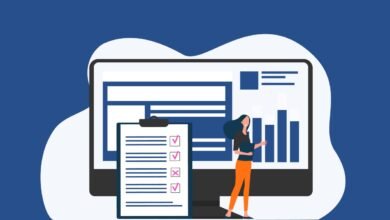
In today’s digital age, maintaining your online privacy is of utmost importance. The internet has become an integral part of our lives, connecting us globally and providing a wealth of information. However, there are times when you might feel the need to remove yourself from the online world and reclaim your privacy. Whether it’s due to concerns about online security or a desire to disassociate from your digital presence, this article will guide you through the process of removing yourself from the internet step by step.
Remove Yourself From The Internet
Even if such information is not readily accessible online for Google searches, it is still there. You receive so many spam emails as a result. However, there might be more severe repercussions. A wild post from a fabulous vacation in the sun, for instance, could have seemed appropriate at the time, but it could come back to bother you later on, perhaps when you’re seeking a job.
Read Movie: What is the Internet of Things (IoT)?
The Importance of Online Privacy
In the digital age, our personal information is often stored and accessible online, making it crucial to safeguard our privacy. Removing yourself from the internet allows you to regain control over your data, limiting the risks of identity theft, cyberstalking, and unauthorized use of your information.
Assessing Your Online Presence
Before embarking on the journey of removing yourself from the internet, it’s important to assess your current online presence. Search for your name on popular search engines and social media platforms to identify the extent of personal information available. Take note of websites, profiles, or accounts that contain sensitive information.
Deleting Social Media Accounts
Social media platforms often hold a significant amount of personal data. To begin the process of removing yourself from the internet, start by deleting or deactivating your social media accounts. Follow the platform’s instructions to ensure your accounts are permanently removed.
Removing Personal Information from Search Engines
Search engines index a vast amount of information, including personal details. Fortunately, most search engines offer tools to remove specific search results. Contact each search engine’s support or use their designated removal request forms to eliminate personal information from their search results.
Unsubscribing from Mailing Lists and Newsletters
To minimize the amount of personal information available online, unsubscribe from mailing lists and newsletters. Look for the “unsubscribe” link at the bottom of the emails and follow the instructions to remove yourself from their distribution lists.
Deleting Online Accounts and Profiles
Review the various online accounts and profiles you’ve created over the years. Delete accounts that are no longer necessary or contain personal information you wish to remove. Most websites and online services provide an account deletion or deactivation option within their account settings.
Securing Your Digital Footprint
To further protect your online privacy, enhance your digital security measures. Enable two-factor authentication for important accounts, use strong and unique passwords, and regularly update them. Consider using a reputable virtual private network (VPN) to encrypt your internet connection and prevent tracking.
Removing Personal Information from People Search Websites
People search websites to compile public records and personal information from various sources. Search for your name on these websites and follow their procedures for opting out or removing your information. Be aware that some websites may require identity verification to complete the removal process.
Monitoring Your Online Presence
Even after taking steps to remove your personal information, it’s essential to monitor your online presence regularly. Set up Google Alerts with your name and relevant keywords to receive notifications whenever new information appears online. This allows you to address any potential privacy breaches promptly.
Protecting Your Privacy Moving Forward
Maintaining your privacy in the digital realm requires ongoing effort. Be cautious about the personal information you share online, limit access to your profiles, and regularly review your privacy settings on websites and social media platforms. Educate yourself about data privacy best practices to stay informed and proactive.
Read Movie: 7 Best Ways to Send Large Files Over the Internet
Conclusion
In conclusion, safeguarding your online privacy by removing yourself from the internet is a proactive step in protecting your personal information and maintaining control over your digital presence. By following the outlined steps in this article, including assessing your online presence, removing personal information from social media, deleting online accounts and profiles, managing search engine results, addressing data brokers and people search sites, protecting your online reputation, securing your digital footprint, and addressing offline data sources, you can significantly reduce your digital footprint and enhance your online privacy.
It’s important to remember that complete erasure from the internet is challenging, as some information may still be archived or accessible through various channels. However, by diligently managing your online presence and implementing strong privacy measures, you can minimize the risks associated with online exposure.
FAQs
1. Is it possible to completely remove all personal information from the internet?
While it is challenging to remove all traces of personal information from the internet, following the steps mentioned in this article will significantly minimize your online presence and enhance your privacy.
2. Will removing myself from the internet delete my previous online activities?
Removing yourself from the internet primarily focuses on deleting personal information and accounts. However, it does not erase your past online activities or content shared by others.
3. How often should I monitor my online presence after removing myself from the internet?
It’s recommended to monitor your online presence periodically, especially after taking significant steps to remove your personal information. Setting up Google Alerts can help automate this process.
4. Can I regain access to my social media accounts after deleting them?
Once you delete your social media accounts, it is often challenging or impossible to recover them. Make sure to download any important data or content before proceeding with the deletion.
5. Are there professional services available to assist in removing personal information from the internet?
Yes, several professional services specialize in helping individuals remove personal information from the internet. However, be cautious when choosing such services and ensure their credibility and reputation.
Now that you have learned the steps to remove yourself from the internet, take action and regain control over your online privacy. Remember, safeguarding your personal information is an ongoing process, and staying informed about privacy practices will help you navigate the digital landscape with confidence.












One Comment